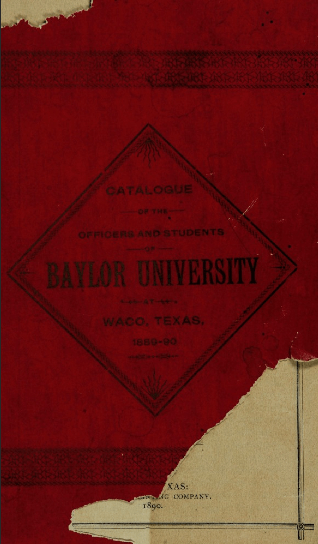
Cover of the 1889-1890 Catalogue of the Officers and Students of Baylor University. Image courtesy the Baylor University Libraries Digital Collections, from an original held by The Texas Collection, Baylor University.
Classes roared back into action last week, and the campus of Baylor University is once again full of vitality, excitement, confusion and triumph – and that’s just what’s involved with trying to find a parking space near the library. But seriously, we’re excited to have students back, as it’s their passion for learning that makes this beautiful campus come alive every fall.
That longing has been part of the Baylor student experience since 1845, a common tie to the earliest days of the university. But much of the college experience has changed since our founding at Independence, Texas, and that is nowhere more evident than in sections of the 1889 Annual Catalogue with headings like “Discipline,” “By-Laws,” “Extravagance” and “Moral and Religious Instruction.” Let’s take a look at some of the established norms for the men and women of Baylor’s freshman class of 1889.
Discipline
Although occupying only a paragraph’s worth of printer’s ink, this section outlines the basis for recording and enforcing the university’s system of demerits and other “violations of the regulations and laws of the University.” While disclaiming that discipline is “firm, but kind,” the section indicates that each department had an officer whose responsibility it was to keep a log of all violations and make a report of them to the President. This officer, the catalogue warns, will have “all the respect of a teacher or professor.”
By-Laws
The by-laws of the university kept order by employing a system of demerits that were issued to students who violated any of the 43 items listed under this section. Some of the more interesting points include:
3. Disturbances in the chapel, or lecture room, or in any part of the college premises, shall incur a demerit of from two to ten.
5. Absence from rooms after dark and before 9 p.m. a demerit of five; after 9 a.m. a demerit of ten.
6. Any student guilty of playing cards, or any game of hazard, shall be suspended or otherwise severely punished.
10. No student shall be guilty of nocturnal disorders or revelings, nor become connected with any dancing school, society, or social club without the approval of the faculty …
20. Any student guilty of using profane or obscene language, shall be publicly reprimanded, and for the third offense shall be suspended or otherwise punished.
28. No young lady of the Institution, boarder or day student, shall receive the attention or escort of young men. A violation of this rule will incur a heavy penalty at the discretion of the faculty. Books and beaux never go together.
41. Any student who shall ring the University bell, not directed to do so by the proper officer, shall be suspended or otherwise punished.
Extravagance
In a section that reveals just how much the philosophy behind what “parental support” means to a college student has changed, the “Extravagance” section outlines the dangers of providing money to students beyond what is necessary for tuition, room and board. Noting that “there is such a diversity of taste and means among our patrons and students,” (in other words, some students will come from much wealthier backgrounds than others) the section essentially tells students that having extra spending money will negatively impact their ability to succeed in classwork. And while it remains true that college students all too often fall prey to the trap of spending far beyond their means/needs, to see a prohibition against profligacy spelled out in the student handbook is unusual for modern eyes.
Moral and Religious Instruction
One major element of a Baylor education remains consistent over the years: moral and religious support, encouragement and exploration. And while this section contains the expected information about Baylor’s beliefs in the Bible, regular church attendance and honoring the Sabbath, the last two sentences reveal the university’s concern about the influence of popular culture on the student body.
All reading of novels is forbidden as an unmitigated evil. All indiscriminate reading o[f] novels, unless selected by parents or teachers, is an injury.
***
One wonders what the writers of the 1889 catalogue would think if they were to see the campus of 2013? Perhaps after they took in the sheer size of campus, the technological wonders on display, and the drastic change in the clothing choices sported by today’s student body, they would find that today’s Baylor Bears share a common core of beliefs about God, education and country with their 19th-century ancestors.
One thing is certain, though: they’d be hard-pressed to pry the smart phones – on which they can access millions of digital novels at a moment’s notice – out of their hands. No amount of demerits can accomplish that Herculean task.
To view the entire 1889-1890 Catalogue, click here. You can view the entire collection of digitized University Catalogs – including items created during the Baylor at Independence years and the catalogs of Waco University – click here.


